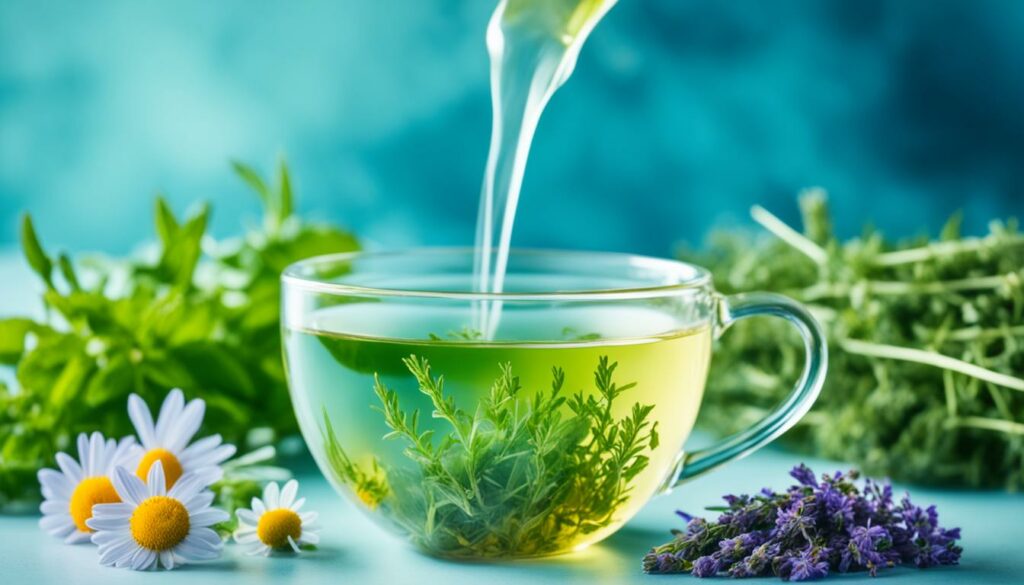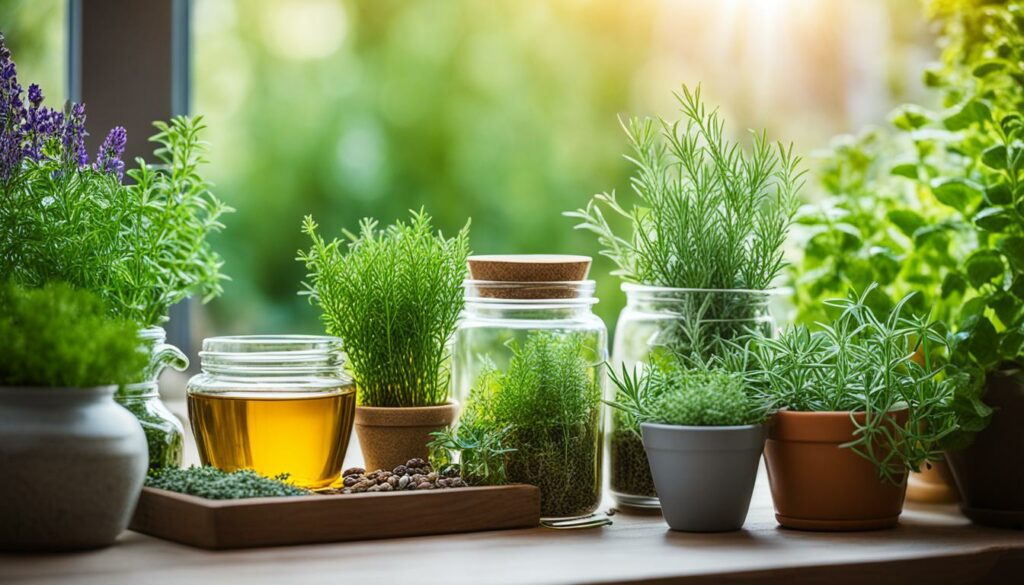A 2019 study found that ashwagandha extracts greatly reduced stress levels. This herb is now a top choice for stress relief, along with chamomile and lavender. More people are choosing herbal remedies over traditional medicines with side effects.
For centuries, herbs have been used to ease stress and anxiety. They offer a gentle way to relax and find emotional balance. This article explores the best herbs for stress relief and how to use them daily. From chamomile’s calming effects to lavender’s soothing scent, these natural remedies can help you handle stress better.
Key Takeaways
- Ashwagandha is scientifically proven to significantly reduce stress levels.
- Chamomile has been shown to help manage symptoms of generalized anxiety disorder.
- Lavender essential oil may provide effective short-term relief for anxiety.
- Passionflower can promote relaxation and reduce anxiety with fewer side effects.
- Consultation with a healthcare professional is essential before using herbal remedies.
Understanding Stress and Anxiety
Stress is a common part of life for many. It comes from different things that can hurt your mental health. Knowing what causes stress and how it links to anxiety helps with managing it.
What Causes Stress?
Many things can make you stressed. Life changes, too much to do, and mental health issues are big ones. These can be from outside or inside you:
- External Factors:
- Work-related pressures
- Personal relationships
- Financial difficulties
- Internal Factors:
- Emotional health
- Personal expectations
Knowing what triggers stress helps you find ways to stay well and reduce stress.
The Impact of Stress on Health
Stress that doesn’t go away can be very bad for your health. It can lead to:
- Heart disease
- Anxiety disorders
- Depression
- Weakening of the immune response
Learning how stress affects your body helps you build ways to bounce back. This might mean changing your life, getting help, or trying supplements. If you’re looking into herbs like chamomile or rhodiola, make sure to trust your sources. For more on herbs and blood pressure, check out this source.
Introduction to Herbal Remedies
Herbal remedies are a great choice for those looking for natural ways to reduce stress. They are proven to help with stress and anxiety, often with fewer side effects than traditional medicines. By choosing herbs, you can boost your emotional strength and enjoy the full benefits of nature.
Why Choose Herbs for Stress Relief?
For centuries, herbs have been used to help people find peace and balance. With 275 million people worldwide dealing with stress and anxiety, there’s a big need for new solutions. Studies show that herbs like lavender and ashwagandha can really help improve your well-being.
- Lavender: Known for over 2,500 years as a calming remedy, its efficacy has been supported by studies showing a reduction in anxiety levels.
- Ashwagandha: Demonstrated effectiveness in reducing cortisol levels, aiding in the regulation of the body’s stress response.
- Mint: The menthol in mint leaves may help alleviate tension, particularly headaches.
How Herbal Remedies Work in the Body
It’s important to know how herbal remedies work with your body for the best results. These natural remedies affect neurotransmitters and hormones, helping you manage stress better. For example, valerian root boosts GABA levels, which helps you relax without feeling sleepy.
Research shows that ashwagandha can lower anxiety after eight weeks, showing its potential for emotional support. These herbs work by balancing your mood and helping your body handle stress naturally.

When looking into herbal remedies, pay attention to their quality, strength, and where they come from. You can find them in many forms, like infusions, tinctures, teas, or capsules. Knowing this helps you make better choices for managing stress naturally.
| Herb | Primary Benefit | Formulations |
|---|---|---|
| Lavender | Calming effect on the nervous system | Oils, teas, tinctures |
| Ashwagandha | Reduces cortisol levels | Capsules, powders, extracts |
| Valerian Root | Enhances relaxation | Teas, tinctures, capsules |
| Peppermint | Relieves tension headaches | Oils, teas, capsules |
| Reishi Mushrooms | Promotes overall wellness | Extracts, powders, capsules |
Best Herbs for Stress Relief
Stress and anxiety affect over 18% of people in the U.S. each year. Many turn to natural remedies for help. Many herbs can calm the mind and ease anxiety. Here are some top herbs for stress relief.
Chamomile: A Calming Flower
Chamomile is known for its calming effects. It helps reduce anxiety and improve sleep. Drinking chamomile tea can help with anxiety and promote relaxation.
Lavender: Relaxation through Aroma
Lavender essential oil is used in aromatherapy for anxiety relief. Its scent can reduce anxiety. You can use it in essential oil diffusers or in teas.
Valerian Root: The Sleep Aid
Valerian root helps improve sleep quality. It increases GABA in the brain, helping with anxiety. It comes as capsules or tea for sleep.
Ashwagandha: The Adaptogen
Ashwagandha is an adaptogen that helps your body handle stress better. It lowers cortisol levels and supports stress and anxiety relief. Adding it to your daily routine can help reduce stress.
Lemon Balm: Mild Yet Effective
Lemon balm helps with anxiety and promotes calmness. Taking 1,000–1,500 mg of lemon balm can help with stress. It’s a gentle option for anxiety relief.
Passionflower: A Natural Sedative
Passionflower is a calming herb used in many cultures. It helps with anxiety by increasing GABA levels. It’s a key ingredient in treating anxiety, available as tea or supplements.
Ginseng: Enhancing Resilience to Stress
Ginseng boosts energy and helps with stress. It improves mental clarity and health. It’s great for those under a lot of pressure.
Rhodiola: Combatting Fatigue and Stress
Rhodiola is known for fighting fatigue and improving focus. It’s a natural remedy used in traditional medicine. It helps reduce stress and improve mood.
How to Use Herbal Remedies
Exploring different ways to use herbal remedies can make your experience better. Many people like using teas, tinctures, and supplements. Each way has its own benefits, helping you find what works for you.
Teas, Tinctures, and Supplements
Herbal teas are a top choice for many. They offer warmth and help with stress, thanks to calming herbs like chamomile and lavender. Tinctures are strong liquid extracts. They let you use more of the herbs you like.
Supplements are another good option, giving you exact amounts of the herbs. Choosing between teas, tinctures, or supplements depends on what fits your health routine.
Essential Oils and Aromatherapy
Essential oils do more than just smell nice. They help with stress relief through aromatherapy. For example, lavender and chamomile oils make spaces calm, whether you’re using a diffuser, adding them to baths, or applying them on your skin.
Learning about these methods helps you get the most from your herbal remedies. Try different mixes to see what helps you feel less stressed or anxious.

Potential Side Effects and Interactions
Many herbal remedies help with stress and anxiety. But, you should watch out for side effects and interactions with medicines. It’s key to know the risks to stay safe. Some herbs might cause bad reactions or make medicines work differently, which can be dangerous. Being informed helps you make smart choices.
Understanding Risks
Side effects from herbs depend on the type and your health. For example, lemon balm might not mix well with certain medicines. Always talk to a doctor before trying new herbs. Mixing herbs like chamomile and valerian with blood thinners can raise the risk of bleeding. Watching out for these risks keeps herbal use safe.
Important Precautions to Consider
Following safety steps can lower the chance of bad effects from herbal remedies. Keep these tips in mind:
- Always talk to a healthcare provider before starting any new herbal supplement, especially if you are pregnant or taking medications.
- Tell your doctor about all herbs you are considering or currently using, particularly if you are prescribed medication.
- Even if you see benefits, watch for side effects closely, especially when first trying herbs.
Here’s a table that lists some common herbal supplements and their possible interactions with medicines:
| Herbal Supplement | Potential Interactions | Recommendations |
|---|---|---|
| Chamomile | Blood thinners, sedatives | Use with caution; consult a doctor. |
| Lemon Balm | Sedatives, thyroid medications, HIV medications | Seek medical advice before use. |
| Ginseng | Warfarin, insulin | Consult healthcare provider for safety. |
| St. John’s Wort | Antidepressants, blood thinners | Discuss possible interactions with a physician. |
Consultation and Professional Guidance
When looking into herbal remedies for stress relief, getting advice from a healthcare professional is key. They make sure the remedies fit your needs, keeping you safe and effective. In-person talks let them check your mental health and suggest the best treatments for you.
This personalized help meets your health needs and fits herbal remedies into your wellness plan.
The Importance of Professional Advice
Talking to a healthcare pro before trying herbal solutions is vital to avoid bad reactions with other meds. They can explain how products like the Deep Stress Adrenal Rescue with Ashwagandha work and what they can do for you. They’ll help you figure out the right amount and how to use it for your stress.
When to Seek Help from a Healthcare Professional
If stress is too much or changes your daily life, it’s time to talk to a healthcare pro. They can suggest treatments that might include therapy or meds, along with herbal supplements. Mixing different approaches can help you recover from anxiety and other mental health issues.
Studies show that combining things like meditation with expert advice works best for mental health.
Conclusion
Using herbal remedies can help you find calm and balance naturally. For years, people worldwide have used these remedies for their calming effects. Ayurveda and Traditional Chinese Medicine are great examples of this.
Herbs like chamomile and ashwagandha help you relax and keep your well-being in check. They manage stress hormones, like cortisol, which is key for feeling calm.
When looking into herbal remedies, you’ll find many options. From calming chamomile to ashwagandha and ginseng, each herb meets different needs. It’s easy to find one that suits you best.
Knowing how these herbs work in your body can make them more effective. This knowledge helps you get the most out of them for stress relief.
While herbal remedies are promising, it’s important to know about possible side effects and seek professional advice. With the right precautions and expert guidance, you can fully enjoy their benefits. This will help you on your path to better mental health and stress resilience.
FAQ
What are the best herbs for stress relief?
Top herbs for stress relief include chamomile, lavender, valerian root, ashwagandha, lemon balm, passionflower, ginseng, and rhodiola. Each offers unique benefits to help ease stress and promote relaxation.
How does chamomile help with anxiety?
Chamomile is known for its calming effects. It has been used to reduce anxiety and improve sleep. Studies show it’s effective for treating generalized anxiety disorder.
Can lavender be used for stress relief?
Yes, lavender is famous for its calming scent. It helps reduce anxiety. You can use it in aromatherapy, teas, or topical applications to relax.
What is ashwagandha, and how does it help with stress?
Ashwagandha is an adaptogenic herb that helps manage stress by lowering cortisol levels. It improves sleep quality and boosts resilience against stress and anxiety.
Are there any risks associated with using herbal remedies?
Herbal remedies are usually safe but can interact with medicines and have side effects. Always talk to a healthcare provider before starting new herbal supplements.
How can I incorporate these herbs into my routine?
You can use herbs in teas, tinctures, extracts, or capsules. Try different methods to see what suits you best.
When should I seek help from a healthcare professional regarding stress?
If stress is too much or affects your daily life, get help from a healthcare professional. They can offer treatment options like therapy and medication.
What is valerian root, and how does it aid in stress relief?
Valerian root helps you sleep better by boosting GABA in the brain. This promotes relaxation and lowers anxiety.
How does ginseng support stress management?
Ginseng boosts energy and mental and physical resilience during stress. It provides restorative benefits.
What are the benefits of rhodiola for stress?
Rhodiola fights fatigue and improves mental clarity during stressful times. It’s a key herb for managing stress naturally.




